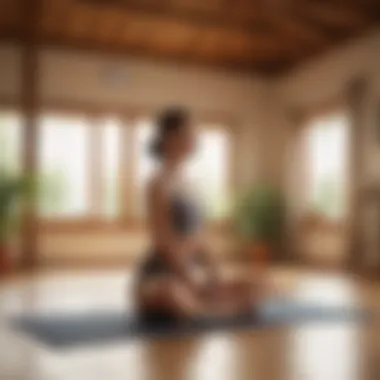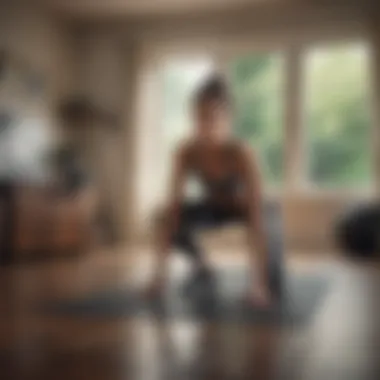Effective At-Home Exercises to Lose Weight Without Equipment - Achieve Fitness Goals Anywhere


Time Management Techniques
In the realm of at-home exercises for weight loss without equipment, effective time management techniques play a pivotal role. Prioritization methods aid in identifying the most important exercises that contribute to weight loss. Task scheduling strategies help in allocating specific time slots for workouts within the busy daily routine. Procrastination prevention tips ensure consistency in exercise routines, promoting steady progress towards weight loss goals.
Personal Development Insights
Embarking on a fitness journey at home necessitates personal development insights for long-term success. Goal setting and achievement techniques enable individuals to set clear objectives for their weight loss journey. Mindfulness practices enhance focus and concentration during workouts, maximizing the benefits of each exercise session. Self-reflection exercises facilitate introspection on progress, helping individuals stay motivated and committed to their fitness goals.
Work-Life Balance Solutions
Maintaining work-life balance while pursuing at-home weight loss exercises is essential for overall well-being. Setting boundaries in professional life allows individuals to allocate dedicated time for workouts without interferences. Stress management techniques assist in dealing with daily challenges, ensuring a calm mindset conducive to effective exercise. Adopting healthy habits for work-life integration ensures a holistic approach to fitness, blending exercise seamlessly into one's daily routine.
Productivity Tools and Resources
Leveraging productivity tools and resources enhances the efficiency of at-home workout routines. Time tracking apps and software enable individuals to monitor and optimize the time spent on various exercises. Task automation tools streamline workout processes, eliminating unnecessary manual tasks and saving time. Efficiency-boosting techniques optimize workout performance, allowing for a more effective use of limited time.
Wellness and Lifestyle Recommendations
Alongside at-home exercises, incorporating wellness and lifestyle recommendations is crucial for holistic health. Healthy living tips encompass nutrition advice and lifestyle choices that complement weight loss efforts. Tailored exercise routines for busy individuals offer efficient workouts that fit seamlessly into hectic schedules. Mental health maintenance strategies focus on emotional well-being, ensuring a balanced approach to overall health and fitness.
Introduction
In today's fast-paced world, the idea of carving out time to visit a gym might appear daunting. However, the realm of at-home workouts offers a viable solution to achieve weight loss goals sans the necessity for sophisticated equipment. This article delves into an array of effective exercises that can be seamlessly executed within the confines of one's home, aiding in shedding excess weight and enhancing overall fitness levels.
Overview of At-Home Workouts
Benefits of Working Out at Home
Embarking on a workout regimen within the homely confines bears numerous advantages. The flexibility it provides in scheduling workout sessions is paramount. One can seamlessly integrate workout routines into their daily schedule without the hassle of commuting to a gym. This approach not only saves time but also eliminates the need for pricey gym memberships, making fitness accessible to a broader demographic. Moreover, the comfort of exercising in a familiar environment cultivates a sense of ease, fostering long-term commitment to fitness goals.
Tips for Success
When delving into at-home workouts, certain tips can enhance the efficacy of the fitness journey. Firstly, dedicating a specified workout space can mentally prepare individuals for exercise each day. Establishing a routine is critical for consistency and results. Engaging in a diverse range of exercises targeting various muscle groups ensures holistic fitness development. Furthermore, setting realistic goals and tracking progress are indispensable tools for staying motivated throughout the fitness journey.
Cardiovascular Exercises
In the realm of at-home workouts without the need for specialized equipment, cardiovascular exercises stand out as pivotal components of any fitness routine. The essence of cardiovascular exercises lies in their ability to elevate the heart rate, enhance blood circulation, and promote overall cardiovascular health. Jumping Jacks, High Knees, and Burpees are exemplary cardiovascular exercises that require minimal space and effectively contribute to weight loss goals without the necessity of expensive equipment.
Jumping Jacks
How to Perform Jumping Jacks


When delving into the technique of executing Jumping Jacks, it's crucial to begin by standing with feet together and arms at your sides. Subsequently, jump while spreading your legs laterally and raising your arms above your head. Return to the initial position by jumping back to the starting stance. The repetitive nature of this exercise not only elevates the heart rate but also engages multiple muscle groups simultaneously, making it a versatile and efficient choice for individuals aiming to shed excess weight in a home setting.
Benefits of Jumping Jacks
The advantages of incorporating Jumping Jacks into one's workout regimen are manifold. Not only does this exercise effectively burn calories and contribute to weight loss, but it also enhances cardiovascular endurance and improves coordination and agility. Furthermore, Jumping Jacks serve as an excellent warm-up exercise, priming the body for more intense physical activity while fostering a sense of rhythm and movement. The simplicity and effectiveness of Jumping Jacks make them a popular and accessible choice for individuals looking to boost their cardiovascular fitness levels at home.
High Knees
Technique for High Knees
In mastering the technique for High Knees, it's essential to stand in an upright position with feet hip-width apart. Lift your right knee towards your chest swiftly while maintaining a tall posture, then alternate with the left knee in a rapid motion resembling running in place. This high-intensity exercise not only escalates the heart rate significantly but also engages the core muscles, thereby promoting abdominal strength and overall calorie expenditure.
Advantages of High Knees
High Knees offer a myriad of benefits for individuals seeking to amplify their cardiovascular workout without equipment. Apart from being a convenient and space-efficient exercise, High Knees target the lower body muscles, including quadriceps and hamstrings, effectively toning and strengthening these muscle groups. Moreover, the dynamic nature of High Knees elevates the workout intensity, promoting fat burning and enhancing physical endurance while requiring minimal time investment, making it an ideal inclusion in a home exercise routine.
Burpees
Steps for Doing Burpees
When executing Burpees, initiate the exercise in a standing position, proceed to drop into a squat position, place hands on the ground, kick feet back to assume a push-up position, perform a push-up, return feet to the squat position, and explosively jump upwards with arms raised. This full-body exercise not only elevates the heart rate drastically but also engages muscles throughout the body, facilitating calorie burning, strength development, and improved cardiovascular efficiency.
Impact of Burpees on Weight Loss
The profound impact of Burpees on weight loss stems from their ability to combine strength training and cardiovascular conditioning into a single dynamic movement. By integrating explosive movements with strength-building components, Burpees elevate the metabolic rate, inducing a state of elevated calorie burn post-exercise. Furthermore, the functional nature of Burpees translates to increased muscle activation, core engagement, and overall physical endurance, rendering them a comprehensive and efficient exercise choice for individuals striving to lose weight and enhance fitness levels at home.
Strength Training Exercises
Strength training exercises play a crucial role in this detailed guide to effective at-home workouts without equipment. These exercises target different muscle groups and help build strength and endurance. By focusing on bodyweight exercises, individuals can achieve significant results in toning and defining their muscles. Additionally, strength training aids in increasing metabolism, which is essential for weight loss as it leads to burning more calories at rest.
Push-Ups
Proper Push-Up Form
Public Push-Up Form is a fundamental element in any workout routine, especially in this context of at-home exercises for weight loss without relying on equipment. The correct posture ensures engagement of the chest, triceps, and core muscles for effective results. Emphasis on maintaining a straight back and engaging the core is crucial for maximizing the impact of push-ups. This form of exercise is deemed beneficial due to its ability to target multiple muscle groups simultaneously, making it an efficient choice for those looking to enhance their overall fitness levels at home.
Muscles Targeted
Understanding the specific muscle groups targeted by push-ups provides valuable insight into why they are a popular choice in this article on at-home exercises for weight loss. Push-ups primarily work the chest, arms, shoulders, and core, offering a comprehensive upper body workout. This exercise efficiently strengthens these muscle groups, promoting better posture and overall strength. While push-ups require no equipment, their effectiveness in engaging various muscles makes them a popular choice for individuals seeking a well-rounded workout routine without leaving home.
Squats


Correct Squatting Technique
Mastering the correct squatting technique is essential when focusing on strength training exercises for weight loss at home. The proper execution involves keeping the feet shoulder-width apart, engaging the core, and lowering the body as if sitting back into a chair. This technique not only targets the quadriceps, hamstrings, and glutes but also helps in improving overall lower body strength. Its simplicity and effectiveness make it a preferred choice for individuals looking to strengthen their lower body muscles without the need for equipment.
Benefits of Squats
Exploring the benefits of squats reveals why they are a vital component of at-home exercises for weight loss. Squats help in developing lower body strength, enhancing mobility, and promoting better balance and posture. Additionally, incorporating squats into a workout routine can boost calorie burning and metabolism, contributing to weight loss goals. These benefits make squats a versatile and impactful exercise for individuals of various fitness levels seeking to achieve noticeable results from their at-home workouts.
Planks
Variations of Planks
The inclusion of various plank variations in a workout routine adds depth and intensity to core strengthening exercises for weight loss at home. Different plank positions, such as side planks, forearm planks, and shoulder taps, target various core muscles while also engaging the arms, shoulders, and back. This variety not only prevents monotony in workouts but also challenges the core muscles from different angles, leading to improved stability and strength.
Core Strengthening
Core strengthening is a pivotal aspect of at-home exercises for weight loss, and planks are instrumental in achieving this goal. Planks engage multiple muscle groups in the core, including the rectus abdominis, obliques, and transverse abdominis, helping develop a strong and stable midsection. By incorporating planks into the workout routine, individuals can enhance their posture, reduce the risk of back pain, and improve overall physical performance. The versatility and effectiveness of core strengthening through planks make them an indispensable exercise for individuals aiming to lose weight and strengthen their core muscles at home.
Flexibility and Balance Exercises
In the realm of at-home exercises aimed to enable weight loss without the necessity of specialized equipment, focusing on flexibility and balance exercises holds immense significance. These types of exercises not only contribute to overall body wellness but also play a crucial role in enhancing posture, preventing injuries, and boosting athletic performance. By integrating flexibility and balance exercises into your workout routine, you can effectively target different muscle groups, improve range of motion, and cultivate stability.
Yoga Poses
Yoga poses, also known as asanas, form a vital component of flexibility and balance exercises in the context of at-home workouts for weight loss. Popular yoga asanas encompass a variety of postures that emphasize stretching, strength, and relaxation. Incorporating these poses not only promotes physical flexibility and balance but also nurtures mental tranquility and mindfulness. The cornerstone of popular yoga asanas lies in their ability to engage multiple muscle groups simultaneously, promoting alignment and vitality.
Popular Yoga Asanas
From downward-facing dog to tree pose, popular yoga asanas offer a diverse array of postures that cater to different skill levels and fitness objectives. Each yoga asana possesses unique benefits, such as improved posture, increased flexibility, enhanced focus, and stress reduction. The fusion of breath control with movement characterizes the essence of popular yoga asanas, enhancing mind-body cohesion and fostering holistic well-being.
Importance of Flexibility
Emphasizing the significance of flexibility within the spectrum of at-home exercises for weight loss underscores its pivotal role in optimizing physical performance and reducing the risk of injuries. Flexibility not only enhances muscle elasticity and joint mobility but also augments overall functional capacity and athleticism. Integrating flexibility training into your workout routine can lead to improved muscle coordination, greater agility, and enhanced resilience against physical stressors.
Single-Leg Stands
Among the repertoire of balance exercises conducive to weight loss sans equipment, single-leg stands stand out as a cornerstone movement for enhancing stability, proprioception, and lower body strength. By practicing single-leg stands, individuals can refine their balance skills, fortify ankle support, and develop core engagement. This exercise not only targets the muscles responsible for maintaining equilibrium but also aids in correcting asymmetries and refining spatial awareness.
Technique for Single-Leg Stands
Mastering the technique for single-leg stands involves standing on one leg while maintaining proper posture, aligning the body's center of mass, and engaging stabilizing muscles. This exercise requires focus, control, and gradual progression to bolster balance capacities effectively. By adhering to correct form and alignment during single-leg stands, individuals can enhance their neuromuscular coordination, refine their balance control, and cultivate a deeper mind-body connection.


Enhancing Balance
Enhancing balance through targeted exercises like single-leg stands contributes significantly to overall physical well-being, postural alignment, and injury prevention. Improved balance not only fosters stability and coordination but also enhances athletic performance and functional mobility. By integrating balance-enhancing movements into your workout regimen, you can heighten spatial awareness, strengthen stabilizing muscles, and fortify joint stability.
Leg Raises
In the realm of core-strengthening exercises that facilitate weight loss and muscle conditioning at home, leg raises emerge as an impactful movement for activating the abdominal muscles and sustaining core stability. By incorporating leg raises into your workout routine, you can effectively target the lower abdominal region, enhance muscular endurance, and improve postural alignment.
Performing Leg Raises
The process of performing leg raises entails lying on your back, lifting your legs towards the ceiling in a controlled manner, and lowering them back to the initial position without arching your back. This exercise demands focus on core engagement, controlled movements, and proper breathing techniques to maximize its effectiveness. Leg raises facilitate isolated activation of the lower abdominal muscles, fostering overall core strength and endurance.
Core Activation
The concept of core activation pertains to the deliberate engagement of the body's core muscles to stabilize the spine, optimize movement patterns, and enhance athletic performance. By prioritizing core activation during exercises like leg raises, individuals can develop a strong, functional core that supports posture, balance, and dynamic movements. Strengthening core muscles through targeted activation promotes spinal alignment, reduces the risk of back pain, and fosters overall physical robustness.
Full-Body Workouts
In the realm of at-home exercises for weight loss, full-body workouts stand as pillars of efficacy and efficiency. These comprehensive routines engage multiple muscle groups simultaneously, maximizing calorie burn and muscle development. Full-body workouts are essential in this article because they provide a wholesome approach to fitness, targeting various areas of the body in each session. Incorporating full-body exercises ensures a balanced workout regimen that promotes overall strength, endurance, and mobility. Moreover, these exercises require minimal or no equipment, making them accessible to a wide range of individuals seeking to enhance their fitness levels without elaborate setups or gym memberships.
Mountain Climbers
Execution of Mountain Climbers
Exploring the Execution of Mountain Climbers unveils a dynamic exercise that merges cardiovascular benefits with core engagement. This high-intensity move involves bringing knees towards the chest alternately, simulating a climbing motion. Its primary contribution lies in boosting heart rate, enhancing agility, and intensifying core activation. The vigorous nature of mountain climbers makes them a popular choice in at-home workout routines for their ability to elevate metabolism and challenge multiple muscle groups simultaneously. While demanding in terms of endurance and coordination, mountain climbers offer exceptional results in terms of calorie expenditure and cardiovascular conditioning.
Calorie Burning Potential
Delving into the Calorie Burning Potential of mountain climbers reveals a compelling aspect of this exercise. The swift, repetitive movements involved in mountain climbers elevate heart rate rapidly, facilitating significant calorie burn in a short span of time. This inherent calorie torching feature makes mountain climbers a favored choice for those aiming to shed excess weight efficiently. By engaging large muscle groups and promoting intense exertion, mountain climbers exemplify a high-impact, low-time investment exercise that can contribute significantly to weight loss goals.
Bicycle Crunches
How to Do Bicycle Crunches
Mastering the art of Bicycle Crunches introduces an effective core-strengthening exercise that targets abdominal muscles with precision. This exercise involves a twisting motion that engages obliques and rectus abdominis, promoting toning and definition in the midsection. By alternating knee-to-elbow movements, Bicycle Crunches challenge core stability and endurance, offering a comprehensive abdominal workout. The coordinated effort required for proper execution ensures thorough engagement of abdominal muscles, contributing to improved strength and appearance.
Engaging Abdominal Muscles
Examining the importance of Engaging Abdominal Muscles during Bicycle Crunches underscores the significance of targeting this muscle group for enhanced core strength. The focused nature of this exercise isolates abdominal muscles, fostering development and toning of the core region. By maintaining constant tension on the abs throughout the movement, individuals can actively engage these muscles, leading to greater recruitment and efficacy in strengthening the core. Engaging Abdominal Muscles during Bicycle Crunches not only fosters aesthetic benefits like a toned midsection but also bolsters functional strength and stability.
Jump Squats
Guidelines for Jump Squats
Navigating through the Guidelines for Jump Squats uncovers a powerful plyometric exercise that combines lower body strength training with explosive power. Jump Squats entail squatting down and propelling upwards explosively, engaging leg muscles extensively. The guidance to maintain proper form and alignment while executing jump squats is critical to prevent injury and maximize effectiveness. By incorporating jump squats into workout routines, individuals can enhance lower body strength, cardiovascular endurance, and overall power output. This exercise's emphasis on explosive movement contributes to improved athletic performance and functional fitness.
Incorporating Plyometrics
Exploring the realm of Incorporating Plyometrics within Jump Squats reveals a strategic approach to enhancing muscular power and agility. Plyometric exercises, like jump squats, involve rapid muscle-lengthening and contraction cycles, boosting strength and coordination. The integration of plyometrics in jump squats amplifies the intensity of the exercise, elevating heart rate and calorie burn significantly. Additionally, plyometric training stimulates fast-twitch muscle fibers, fostering quick and explosive movements essential in sports and functional activities. By integrating plyometrics into jump squats, individuals can tap into enhanced neuromuscular adaptations, promoting athleticism and overall fitness levels.



